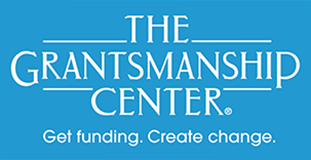- TRAINING
- WEBINARS
- CUSTOMIZED TRAINING
- NATIVE PARTNERS
- MEET THE GRANTMAKERS
- RESOURCES
- ABOUT US
(213) 482-9860
(800) 421-9512
Los Angeles, CA 90017-1418
© Copyright 1996-2025 The Grantsmanship Center
(213) 482-9860 • (800) 421-9512
Los Angeles, CA 90017
© Copyright 1996-2025 The Grantsmanship Center


